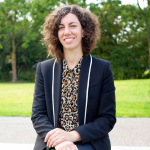The Digital Economy revolutionises
how we work, how we compete, how we organize, how we innovate
At CoDE, we push the boundaries of knowledge and management practice in the Digital Economy through leading-edge research and deep engagement with business and government
Digital Transformation
A wealth of new business models are made possible by digitisation.
How can entrepreneurs implement them faster in ways that create sustainable benefits?
How can established businesses escape the constraints of legacy technology and practices?
How can they explore new forms of value creation and monetisation?
Example: Digital innovation and public values in government, Dr Carla Bonina
Through a longitudinal case study in Mexico’s trade system, Dr. Bonina explores how digital innovation contributes to the enactment of public values in government. This multi-method project develops a case study and uses critical discourse analysis. It applies publicness theory from policy, and social theory in information systems research, to study the way governments generate value in its contexts. Outcomes: Two journal articles under development; contribution to the field of management of information systems; practitioner advice to governments in Latin America seeking digital transformation.
Example: Establishing national eID systems, Dr Ben Eaton
How can governments and banks cooperate in order to establish national electronic identification systems that benefit citizens and commerce? Dr Eaton devised a qualitative comparative case study of the emergence of national eID in Norway, Denmark and Sweden based on interviews and text analysis of key stakeholders. Outcome: a conference paper at HICSS 2017 (Best Paper award), and acceptance for publication in the Journal of IT in 2017; contribution to policy debates regarding the role of Management Information Systems in processes of Financialization, particularly with regard to the role of national governments and citizens. Co-authored with colleagues from Copenhagen Business School and funding was seeded with a £200k research grant from Telenor ASA.
Agile Innovation Practices
Both public and private sector teams must operate effectively, move quickly to act on “weak signals”, and convert knowledge into action.
What is an Agile approach to business, in practice?
How can teams and organizations move quickly, yet keep control in the face of complexity?
Example: Examining the translational continuum for ideas, from research to applications in society and business, Ms Megan Beynon
Under which conditions do researchers become academic entrepreneurs? Under which conditions do researchers become entrepreneurial academics? How can the process of applying ideas in multiple contexts be facilitated to maximise the impact of those ideas? Through a series of case studies of academic and business R&D knowledge transfer, Senior Research Fellow and PhD candidate Megan Beynon explores these questions and aims to contribute to the innovation management and knowledge management academic literatures, and to improve academics’ and business intrapreneurs’ and entrepreneurs’ practices.
Digital Platforms and Innovation Ecosystems
The main new organization of the digital economy is the digital platform. Platforms such as Google, Facebook, Amazon, Uber, and airBnB are re-defining how to create and capture value in our interconnected global economy.
Which industries are likely to be Uber-ized?
How can firms develop and transform their technologies into industry platforms?
How can they sustain vibrant innovation ecosystems?
How can practitioners and managers learn to operate and compete in a platform economy?
Example: Technological transitions in platform-based ecosystems, Prof Annabelle Gawer
Why do intergenerational technological transitions fail in platform-based ecosystems? This empirical study of the US videogame industry explores the paradox of technological transitions within platform-based ecosystems: while they provide superior technologies for end-users, they create costly adjustments for game developers. Trade-offs are identified and managerial implications drawn. Co-authors @ Bocconi and L Munich U. Outcome: Currently R&R at 4* Strategic Management Journal.
Example: The Platform Strategy Handbook, Prof Annabelle Gawer
Whether they harness the power of innovators worldwide, or whether they facilitate exchanges and transactions across consumers and users through online marketplaces, platforms are transforming competition and innovation in the digital economy. They are built on a technological core, and structure business relationships in specific ways, which are not well understood.
Co-authored with MIT Prof Michael Cusumano and Harvard Business School Prof David Yoffie, this book clarifies how to compete and win in platform industries.
Example: Understanding the role of control in successful digital platform innovation, Dr Ben Eaton
How can we understand the interplay between control and innovation in digital platforms? Dr Ben Eaton explores this question in a research programme (with co-authors from Copenhagen Business School, Westerdals ACT Oslo, LUISS Rome, and Olin College USA) through novel research designs involving qualitative case studies informed by narrative analysis of digital platform innovation processes, based on data extracted from online sources. Contribution to the innovation literature (within management of information systems) and management strategy and product management literatures. Outcome: a published 5* journal publication in MISQ; more submissions targeted in 2017.
Open Data
The speed with which large amounts of data are generated from a plethora of sources creates many new opportunities.
How do open data initiatives and APIs enable innovation?
How can you harness the power of open data and big data to stimulate demand for your offerings, and help you engage customers and partners?
Example: Open data and innovation ecosystems, Dr Carla Bonina
How is value created and captured in open data ecosystems? What mechanisms enable collaboration and leverage solutions with open data and open resources? Through in depth case studies including Latin American cities and the European audio industry, this study contributes to the open innovation, entrepreneurship and public management literatures. Outcomes: policy conference presentations (International Open Data Conference, ConDatos) + working papers for policy outlets and management journals. Engagement with government, businesses and entrepreneurs; advice on open data strategies and emerging business models. Related grants: Audio Commons Project, European Commission grant #688382 (2016-2019, €707,458, with Dr David Plans); ESRC- GCRF Development implications of digital economies (DIODE) research network (2017-2018, with U Manchester).
Blockchain, Cryptocurrencies and Distributed Ledgers
The impact of cryptocurrencies and their underlying blockchain technology are likely to be felt across many industries and sectors.
How will key industries respond?
Will notions of trust and identity be redefined as a result?
How must policy and practice evolve?
Example: CREDIT: Cryptocurrency Effects in Digital Transformations, Prof Roger Maull
This £500k RCUK (SBS value £320k) in collaboration with Imperial College explores issues emerging from cryptocurrencies such as Bitcoin and the blockchain technology that underlies them. Blockchain uses algorithms to store and record transactions using blocks which are then added to a linear ‘chain’ of existing blocks using a cryptographic signature. A related concept is that of the distributed ledger. This is an asset database which is shared across a ‘peer-to-peer network’. The data is immutable. As there is no central administrator, the assets stored in the ledger are maintained cryptographically through the use of keys and signatures ensuring the security, accuracy and integrity of the data is upheld. Distributed ledgers are currently being used within government, finance, the diamond industry, real estate and land registry but potential applications are wide and far reaching. CREDIT’s research focuses on the effects of cryptocurrencies on the digital transformation of business models, and the clarification of issues around governance, standards and regulation.
Example: ConTriVE: Moderating Mechanisms in addressing Vulnerability for the Design of Business and Economic Models, Prof Roger Maull
This £1.2M EPSRC grant (SBS value £220k) with partners Warwick Manufacturing Group, UWE, University of Cambridge Cavendish Labs, explores whether and to what extent individual subjective perceptions of Trust, Identity, Privacy, and Security (TIPS) coincide with the objective assessment of TIPS (e.g. by the relevant governmental or cybersecurity institutions). This is valuable because, to date, research on the Digital Economy has only addressed a question of reducing objective vulnerability of systems, via technical solutions such as security protocols and algorithms that ‘protect’ the individual. But we know very little about how the subjective and the objective assessments of TIPS relate.
This project concentrates on understanding and measuring user subjective vulnerability to TIPS issues, and studies implications of this subjective vulnerability for business models in the digital economy. The methodology is to use the Hub of all Things platform to conduct live experiments with various scenarios for trading personal data.
Example: ACCEPT: Addressing Cybersecurity and Cybercrime via a co-Evolutionary aPproach to reducing human-relaTed risks, Prof Roger Maull
This £1.1m EPSRC grant (SBS value approx. £100k) in collaboration with UCL, University of Warwick, and Transport Research Lab explores the social and behavioural aspects of cybersecurity and cybercrime. Cyber systems change far faster than biological/material cultures, and criminal behaviour and techniques evolve in relation to the changing nature of opportunities centring on target assets, tools and weapons, routine activities, and business models. In a hyperconnected environment, the structure and behaviours of communities, and the networks and relationships between individuals, businesses and organisations, underpin cybercrime behaviour. This complex, non-linear process can lead to co-evolution in the medium-longer term.
This research (1) Incorporates theoretical concepts from social, evolutionary and behavioural sciences which provide insights into the co-evolutionary aspect of cybersecurity/cybercrime ecosystems; (2) Draws on extensive real-world data from different sources on behaviours of individuals and organisations within cybersecurity/cybercrime ecosystems; and (3) Develops a framework that can provide practical guidance to system designers on how to engage individual end users and organisations for reducing human-related cyber risks.
ehealth, Wearables, and OneHealth
A revolution is occurring in the health sector. From new medical devices to redesigned business models, digital transformation is enabling new ways to deliver healthcare solutions.
How will digital technology promote wellness and better healthcare?
How can digital solutions provide new insights into prevention, diagnosis, and treatment of diseases?
Which new healthcare businesses and business models will dominate our digital future?
Example: Wearables and workplace stress, Dr David Plans
To which extent can digital technology promote wellness and prevent stress in the workplace? This project focuses on understanding and transforming the way organizations can use data to help employees manage their health. With partners such as BioBeats, BNP Paribas and AXA PPP Healthcare, this project’s unique method blends data capturing from apps, wearables, social media and provides personalised interventions based on artificial intelligence (AI). Outcome: In-field trials; a novel stress algorithm developed.











